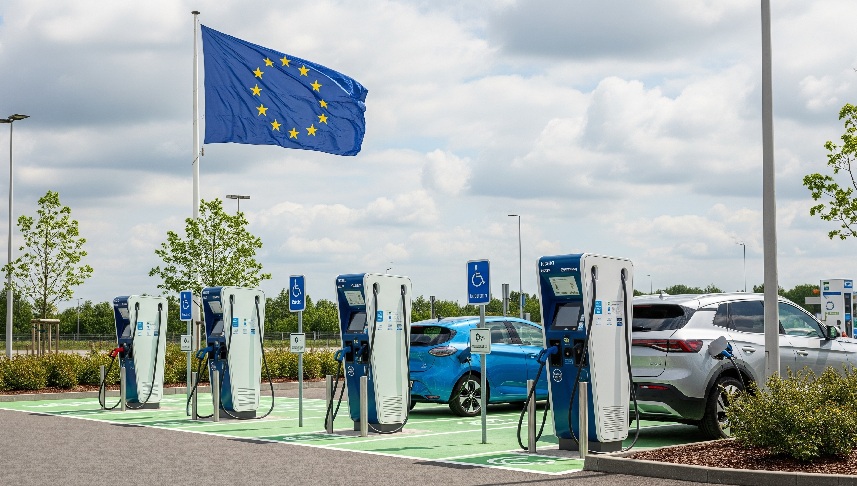EU Carmakers Urge Softer CO₂ Targets, Greater Role for Hybrids and E-Fuels

• ACEA calls for easing EU CO₂ goals, arguing that full electrification by 2035 is unrealistic under current market and infrastructure constraints.
• Proposals include extended compliance periods, hybrid credits, and equal treatment for vehicles using carbon-neutral fuels.
• The European Commission’s year-end review could reshape how the bloc balances industrial competitiveness with climate ambition.
Automakers Push for Flexibility as Electrification Pressures Mount
Europe’s car industry is pressing for a recalibration of the European Union’s CO₂ emission targets, warning that the bloc’s push toward full electrification risks colliding with economic and industrial realities.
The European Automobile Manufacturers’ Association (ACEA), representing companies such as Volkswagen, Stellantis, and BMW, has submitted proposals to the European Commission urging a “more pragmatic pathway” toward decarbonising road transport. The Commission is expected to review the current targets for cars, vans, and trucks by the end of 2025, amid growing concerns over tariffs, global supply imbalances, and slow infrastructure rollout.
Under EU law, automakers must cut new car and van CO₂ emissions by 100% by 2035, effectively banning new internal combustion engine (ICE) vehicles. Intermediate 2030 targets require steep reductions—55% for cars and 50% for vans—benchmarked against 2021 levels. ACEA argues these timelines are no longer feasible, given EV demand gaps, lagging charging infrastructure, and competition from China’s low-cost electric models.
ACEA’s Proposals: Hybrids, E-Fuels, and Extended Deadlines
ACEA’s submission calls for greater regulatory flexibility across vehicle segments. For passenger cars, the group proposes that the 2030 compliance benchmark be based on an average across 2028–2032 rather than a single year, softening the impact of early shortfalls.
The association also seeks to reinstate a more prominent role for plug-in hybrids (PHEVs) and range extenders, which combine battery and combustion technologies. It argues that these vehicles can act as transitional solutions while charging networks mature.
In addition, ACEA is pushing for recognition of vehicles running on carbon-neutral e-fuels and biofuels, placing them on equal regulatory footing with battery-electric models. The group also wants incentives for manufacturers using green materials—such as low-carbon steel—to decarbonise supply chains.
For vans, ACEA recommends adjusting the 50% emissions reduction target for 2030 and allowing compliance for 2025 goals to be assessed over a multi-year period (2025–2029). In the heavy-duty segment, it is calling for an early review of truck CO₂ standards—currently planned for 2027—to prevent what it describes as “unrealistic penalties” on manufacturers.
Tensions with Environmental Advocates
Environmental groups have pushed back sharply. Transport & Environment (T&E) said the ACEA proposals would create loopholes that effectively water down the bloc’s climate goals. According to the NGO’s modeling, adopting ACEA’s approach would mean electric vehicles only need to reach a 52% market share by 2035—well short of the EU’s climate trajectory.
ACEA dismissed that claim as speculative. “The majority of new vehicles sold by 2035 will be electric,” the association said, adding that regulatory flexibility would safeguard Europe’s industrial base without slowing the green transition.
RELATED ARTICLE: Europe’s Auto Industry: Collaboration Key to Staying Ahead in Electric Vehicle Race (ACEA)
Industrial Competitiveness and Climate Policy at a Crossroads
The debate comes as Europe’s automotive industry faces unprecedented pressure from two fronts: rising protectionism and intensifying global competition. The U.S. has imposed tariffs on Chinese-made electric vehicles, while Beijing’s dominance in battery supply chains continues to unsettle European policymakers.
Executives argue that without calibrated transition policies, the EU risks ceding its manufacturing advantage and losing jobs to non-European markets. “Automakers are investing billions in electrification,” an industry source said, “but the infrastructure and consumer demand aren’t keeping pace. Regulation has to reflect that.”
What’s at Stake for Policymakers and Investors
The Commission’s upcoming review will test the balance between environmental ambition and industrial resilience. A softening of CO₂ targets could ease short-term strain on manufacturers but risks undermining investor confidence in the bloc’s climate credibility. Conversely, maintaining current targets could accelerate EV deployment but amplify economic stress in a sector that employs over 12 million Europeans.
Investors, regulators, and supply-chain partners will be watching for how the EU integrates hybrid technologies, e-fuels, and lifecycle decarbonisation into future frameworks. The decision will also shape how automakers allocate capital across electrification, hydrogen, and synthetic fuel projects through the 2030s.
As the Commission weighs its options, Europe’s transport decarbonization strategy stands at a pivotal juncture—caught between environmental imperatives and the political realities of industrial transition.
Follow ESG News on LinkedIn








